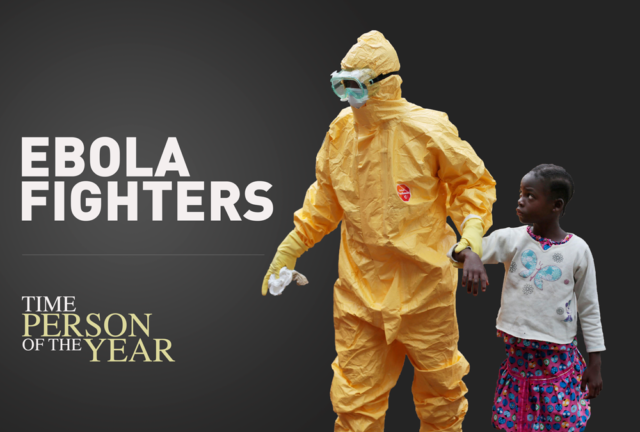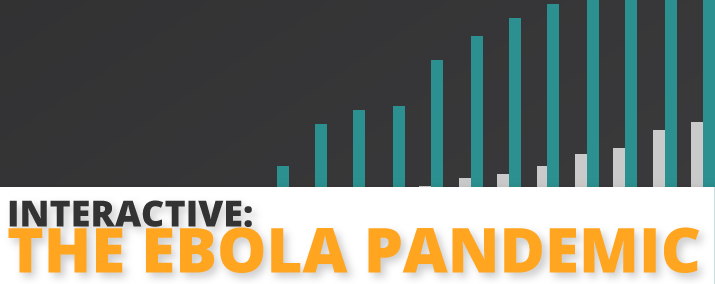The doctors, nurses, and other health care workers fighting Ebola have been named Time’s 2014 Person of the Year award, the magazine said Wednesday.
“The rest of the world can sleep at night because a group of men and women are willing to stand and fight,” Time editor Nancy Gibbs wrote. “For tireless acts of courage and mercy, for buying the world time to boost its defenses, for risking, for persisting, for sacrificing and saving, the Ebola fighters are Time’s 2014 Person of the Year.”
Since the outbreak began in March, an estimated 17,942 people have been infected with Ebola. Of those, 639 health care workers are known to have been infected, of which 349 have died, according to the latest data available from WHO.
Pope Francis was named Person of the Year in 2013. U.S. President Barack Obama was named in 2012 and also in 2008.
Time’s ‘Person of the Year’ has a history of naming world leaders twice, especially U.S. presidents: George W. Bush (2000 and 2004), Bill Clinton (in 1998 with Kenneth Star and in 1992), Mikhail Gorbachev (1989 as ‘Man of the Decade’ and in 1987), Ronald Reagan (1983 with Yuri Andropov and in 1980), Deng Xiaoping (1985 and 1978), Richard Nixon (in 1972 with Henry Kissinger and in 1971), Lyndon B. Johnson (1967 and 1964), Winston Churchill (1949 and 1940), and Joseph Stalin (1942 and 1939).
Franklin D. Roosevelt was named three times: 1941, 1934, and 1932.
Runners-up for the award included Russian President Vladimir Putin (he won in 2007), the Ferguson protestors and activists (‘The Protestor’ was named Person of the Year in 2011), and Alibaba’s Jack Ma. And in case you forgot, you were named Person of the Year in 2006.
This is the second time a person or group has been named for doing medical work. In 1996, Chinese American David Ho was named for pioneering AIDS research.
Health care workers on the front lines of treating Ebola patients are at a heightened risk for contracting the disease given the work they do.
“Doctors are important, but they are only a tiny fraction of all health care workers. Running an Ebola hospital requires nurses, nursing assistants, environmental services staff to clean the facilities, burial teams, and more,” Kathryn Jacobsen, a researcher at George Mason University, told CCTV America. “Health care workers have a higher risk of being exposed to Ebola because a lot of them take care of sick family members and friends outside of their working hours. Even off the job, many of them are still doing clinical work.”
Foday Gallah, an ambulance driver who survived infection, told Time he considered his immunity a holy gift.
“I want to give my blood so a lot of people can be saved,” he said. “I am going to fight Ebola with all of my might.”
The vast majority of cases have occurred in three west African countries: Guinea, Liberia, and Sierra Leone. Their health care systems were not strong before the outbreak and began to crumble as the pandemic spread, overwhelming facilities.
“Prior to the outbreaks, these countries had only one to two doctors to treat a population of nearly 100,000 people,” Dr. Margaret Chan, Director-General of the World Health Organization, said Wednesday in Geneva. “That number has been diminished as more than 600 health care staff have been infected.”
Aid from other countries have been sent to the affected areas to help contain the outbreak –such as the U.S., China, Britain, and Germany — including funds, facilities, protective gear, and health care workers.
But of the $260 million WHO said it needed to combat the disease, $186.8 million had been received with another $31.9 million pledged, leaving a gap of $41.3 million.
U.N. Secretary-General Ban Ki-moon said the world needs “to do whatever it takes” to help stop the virus’ spread, and to help the hard-hit countries recover.
“The international response to date has been unprecedented in its speed and generosity, but much more will be asked before this emergency is over,” the secretary general said, adding that the “fear of Ebola is moving faster than the virus” itself.
See all of our reporting on the Ebola outbreak here.
 CGTN America
CGTN America

 Click to explore
Click to explore